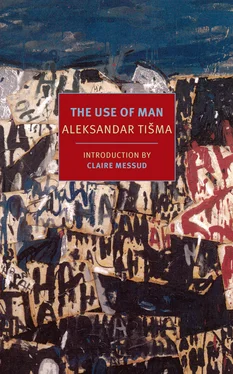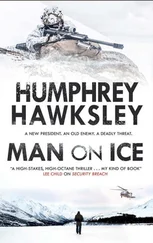Aleksandar Tišma - The Use of Man
Здесь есть возможность читать онлайн «Aleksandar Tišma - The Use of Man» весь текст электронной книги совершенно бесплатно (целиком полную версию без сокращений). В некоторых случаях можно слушать аудио, скачать через торрент в формате fb2 и присутствует краткое содержание. Год выпуска: 2014, Издательство: NYRB Classics, Жанр: Современная проза, на английском языке. Описание произведения, (предисловие) а так же отзывы посетителей доступны на портале библиотеки ЛибКат.
- Название:The Use of Man
- Автор:
- Издательство:NYRB Classics
- Жанр:
- Год:2014
- ISBN:нет данных
- Рейтинг книги:5 / 5. Голосов: 1
-
Избранное:Добавить в избранное
- Отзывы:
-
Ваша оценка:
- 100
- 1
- 2
- 3
- 4
- 5
The Use of Man: краткое содержание, описание и аннотация
Предлагаем к чтению аннотацию, описание, краткое содержание или предисловие (зависит от того, что написал сам автор книги «The Use of Man»). Если вы не нашли необходимую информацию о книге — напишите в комментариях, мы постараемся отыскать её.
A work of stark poetry and illimitable sadness,
is one of the great books of the 20th century.
The Use of Man — читать онлайн бесплатно полную книгу (весь текст) целиком
Ниже представлен текст книги, разбитый по страницам. Система сохранения места последней прочитанной страницы, позволяет с удобством читать онлайн бесплатно книгу «The Use of Man», без необходимости каждый раз заново искать на чём Вы остановились. Поставьте закладку, и сможете в любой момент перейти на страницу, на которой закончили чтение.
Интервал:
Закладка:
He woke, dimly aware that something had disturbed his sleep. His head ached, his body was bathed in sweat, all he wanted was to sleep, but whatever it was that wouldn’t let him was fumbling between his legs. He put his hand out and caught hold of someone’s hand, pushed it away, and in the same moment, relieved, sank back to sleep. But he woke again: the hand was touching him. He pushed it away again, harder. It did not occur to him to wonder whose hand it was or why it was touching him; he only knew that it prevented him from sleeping and that he had to go back to sleep. Sleep was like an animal swallowing him. He slept and again started, bewildered: the hand was back, stubbornly pulling him out of the peace into which he had just settled. He didn’t want to move, such was his longing to return to that peace, but he had to. He found the hand and, turning from his back to his side, shoved it far away, to the neighboring bed. It must have left him alone longer after that, because it was a deep, heavy dream he came out of when the hand intruded again. Sredoje felt that he had no more strength to resist it, yet he could not allow the hand to continue, because what it was doing was something so unnatural that even in his sleep he fought it. He turned over on his back and without opening his eyes felt for his jacket, slipped the revolver out of the pocket, and, relieved that he had found a solution, slid it across his body to his other side, and pulled the trigger.
There was a deafening explosion and a flash that penetrated his eyelids, though they were shut tight. The hand jerked away, he heard a scream, and when he opened his eyes, there was complete darkness and the sound only of his own breathing. He jumped up, wide awake. He realized that he had wounded, if not killed, someone— Waldenheim, probably. He walked across to switch on the light, but remembered that there was no light in the room. And did he want to see the wound, see a dying body? He must flee, he thought, trembling. He pulled on his trousers, stuffed his feet into his shoes, grabbed hold of his jacket. He rushed for the door, but collided with a wall instead; he searched back and forth until he felt wood and the lock. A huge key was sticking out of it — the first moment of relief in this nightmare. He turned the key, pushed at the door, and dove into the free cold night air.
Before him, low in the sky, hung a round white moon, showing every blade of grass. He stopped, listened, could hear only the loud music of the crickets. He started to run, crossed the path and climbed a steep hill. He continued to run blindly all through the night. At the first sign of light he crawled under some bushes at the edge of a meadow and fell asleep. He was awakened by the sun and thirst. He didn’t know where he was. In the distance he caught sight of a man reaping and debated whether or not he should go up to him and ask for water. Perhaps he could persuade the man to give him shelter and even take a message to his father in Belgrade. But the man might turn him over to the authorities, instead.
Sredoje crept out of the bushes and moved on, keeping low, hoping to come across a spring or stream. He started at the least noise, the crack of a twig, the distant bark of a dog, and kept looking over his shoulder. In the evening he came to an isolated house and well in the middle of a field. His lips were parched with thirst and his stomach ached from hunger, but he didn’t dare approach. He slept, listened, retreated from the house in panic, approached it again cautiously. He sheltered in a small knoll overgrown with brush and wild trees, where he could keep watch on the house, the well, and the surrounding area.
In the morning, he saw an old man emerge barefoot from the house, urinate, and then go back inside. Shortly thereafter, a sturdy young woman appeared, went to the well, drew water, poured it into a pail, but left the pail, half full, on the edge. His eyes were glued to that pail. He was so thirsty that he decided, despite the danger, to go over and drink. Several times he left his shelter, but then took fright and crawled back. The old man, meanwhile, went in and out of the house, or sat on a bench in front; twice he ate something. More than once the woman left, stayed away for a while, then came back. Sredoje thought that the old man had spotted him, but wasn’t sure. When it got dark again, the old man and the woman went into the house.
Sredoje made up his mind to go to the well this time, and he calculated how long it would take them to go to sleep. But while he was waiting, he dozed off himself. He was awakened by the cracking of twigs. Before he could spring to his feet, two hands pressed him to the ground.
“Shhh,” he heard someone whisper, the breath hot against his cheek. “Who are you?”
Sredoje could not speak.
“Are you the one who killed the German in the hunting lodge?”
Sredoje nodded before he had time to think.
“Do you have a weapon?”
At last his throat loosened up. “No.”
The hands relaxed and slid deftly over his chest and thighs. “Come on out, but don’t lift your head!”
He obeyed and, crouching, followed the shape, a silhouette, through the bushes. Then the shape split into two: one half continued on in front of him and the other fell into step with him. Sredoje looked at them furtively. The man in front, tall, thin, was wearing a long sweater and nothing on his head; the one beside him was shorter, broad-shouldered, with a cap pulled down over his ears. Both moved quickly, lightly, while Sredoje stumbled. They went uphill and downhill for what seemed to Sredoje an eternity. Every few moments he thought of asking them to let him rest and drink some water, but he didn’t know who they were, though their caution made him sure that they were not on the side of the Germans.
When he thought he couldn’t go any further, his escorts stopped at the foot of an unusually steep hill. They talked softly with someone, though Sredoje could see no one, then they pulled him up the slope, onto a plateau, and under a clump of trees. All around, men were lying, some asleep and some, awakened by their arrival, clutching the coats with which they were covered. Sredoje and his escorts made their way around them and proceeded toward a hollow with fewer trees, then came to a house. A sentry appeared under the eaves. Sredoje’s escorts exchanged a few words with him in a whisper, and he went into the house. After a short wait, the sentry came back and led Sredoje and his escorts inside. They stepped into darkness and the smell of confined bodies, and heard snoring. Then there was a crack of light, a door opened hesitantly, and Sredoje saw a burning candle in front of a face whose eyes were puffy from lack of sleep. The man had a mass of unruly black hair. Sredoje went in and, stopping at a table on which stood an earthenware jug, asked for some water. The disheveled man pointed to the jug, and Sredoje picked it up in both hands and drank deeply.
After that, nothing mattered to him, he felt relieved, safe. The man — the commander of a Partisan detachment that had just formed and was hiding from the Germans — asked how and why Sredoje had killed the German captain. Sredoje told him. Then his escorts took him out and put him in a shed behind the house, blocking the door with a stone. He slept the night on the ground. In the morning, he was let out to relieve himself, was given a piece of bread, an onion, and more water. Later they took him back into the house, where next to the commander sat a man with a round head and bluish lips, the detachment intelligence officer. The two of them interrogated Sredoje along much the same lines as the commander had done the previous night. The intelligence officer was less inclined to believe him than the commander, or pretended to be so, suggesting that Sredoje had been sent by the Germans to infiltrate them. But the fact of Waldenheim’s death put that theory to rest, and in an angry voice the intelligence officer ordered Sredoje to write down everything about himself and the incident on several sheets of typing paper, which he produced from a briefcase on the table. “But this time the truth,” he added, rolling his eyes.
Читать дальшеИнтервал:
Закладка:
Похожие книги на «The Use of Man»
Представляем Вашему вниманию похожие книги на «The Use of Man» списком для выбора. Мы отобрали схожую по названию и смыслу литературу в надежде предоставить читателям больше вариантов отыскать новые, интересные, ещё непрочитанные произведения.
Обсуждение, отзывы о книге «The Use of Man» и просто собственные мнения читателей. Оставьте ваши комментарии, напишите, что Вы думаете о произведении, его смысле или главных героях. Укажите что конкретно понравилось, а что нет, и почему Вы так считаете.












